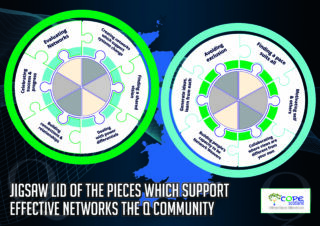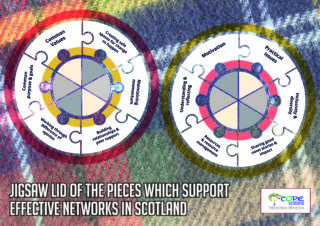Special Interest Group
Philosophy and ethics for health care improvement
To post updates and access other group functionality, please log in. If you are not a Q member please create a guest account.
Latest group activity
-
Thomas John Rose posted an update 8 months, 3 weeks ago
Webinar 19th March 12.00 – 13.00 Dr Thomas Rose
How to overcome today’s lack of NHS process documentation to support effective improvement
How to overcome today’s lack of NHS process documentation to support effective improvement – based on the works of Deming and Juran
Content:
1. Why document your key proc…Read more
-
Thomas John Rose created the document Science informed QI 9 months, 1 week ago
-
Thomas John Rose posted an update 9 months, 1 week ago
I was told today that QI approaches used in the NHS are clinically informed I’m not sure about that so I had a another chat with with ChatGTP. It was good fun but it’s a bit long to post here so I’ve added it to the SIG Documents. If only it were true!
-
Rollo Moore posted an update 9 months, 2 weeks ago
Although my experience is limited I also found the ‘ritualisation’ paper (Facey et al 2023) fascinating and relatable; our situation is perhaps at one remove from the surgical intervention scenario. However in our extended quality control I have wondered about checklists as hints. Our team aims to engage with (measurement) results and assess…Read more
-
-
Hilda Campbell MBE posted an update 9 months, 3 weeks ago
Interesting piece, does make me wonder, whether we should spend more time meaningfully engaging all stakeholders in the co design of safety systems, which means everyone has a sense of why x,y,z, is important…..(including those receiving care) and their part in it and avoid the ‘tick box’ exercise, or the ‘rituals’ of specific team members and…Read more
-
Thanks, Hilda. I am getting error messages from the two links. Could be an issue at my end. Pls could you give a little more source information to help me track them down?
-
Copy and paste links into your browser. It works for me.
-
-
Aagh, Just deleted my post by mistake. I’ll try to re-post.
-
Re-post.
Thanks, I’ll have a good look at the two link documents. Safety is a very miss-understood activity which is a shame because we should all be stakeholders in it and are all subject to it. Safety, or poor safety, is a feature of WAD. So, to be an engaging stakeholder we need to understand WAD and have the mechanisms to review and improve…Read more -
I think you make a valid point, how often the meetings/papers/policies around what is to happen (work as imagined) then the reports on the news, in the papers, of things not going to plan, and sadly on occasion this meaning the loss of life (work as done) now, we need to remember, there are many amazing things achieved within health and social…Read more
-
-
Thomas John Rose posted an update 9 months, 3 weeks ago
-
What are your thoughts on the last paragraph of the Discussion?
-
Thanks, Thomas. I am on board with the idea that audits can have unintended consequences (and it’s something that Polly, Alan and I have considered particularly in raising questions about ‘routine measurement for continuous improvement’). I’m guessing you’re also particularly interested in the idea that patient safety is ‘a property of the…Read more
-
You are right Vikki, loads of food for thought. First routine measurement for continuous improvement (CI) and, I should add, for audit also. A good Quality Management System will call for non-conformity reporting. That is non-conformities in product/Service and/or process. See clause 10.2 in BS ISO 7101:23 Healthcare organisation management -…Read more
-
I’m not sure that I see patient safety as being ‘a property of the system’ directly. What I do see is that the system (WAD) has to be understood by not just the people undertaking the work but by many other stakeholders as well. The best way of promulgating this understanding is by documenting WAD. Desk top reviews can then be undertaken for a…Read more
-
Understanding the ‘system’ is so important. As a long serving Systems Engineer, amongst other things, I have developed my own way of both understanding and documenting systems. (I can provide a real illustration at our next webinar if there is any interest). In the NHS currently it seems to me that the details provided are limited. We have Trusts’…Read more
-
Following on with discussing ‘the system’ – The last requirement of NHS Impact, ‘ Embedding into management systems and processes’ may instigate change. In the self-assessment guide they have a piece on ‘What this looks like in practice’. Starting form scratch this is a phenomenal task! The new British Standard (BS ISO 7101:2023) could satisfy…Read more
-
-
-
Hilda Campbell MBE posted an update 10 months ago
Interesting piece ‘In praise of compassion’ around the ‘tensions’ can exist between science and humanism in health care
https://journals.sagepub.com/doi/pdf/10.1177/1744987109353689
-
The link did not work for me. Is the piece by Jill Maben and others?
-
Thanks for letting me know, strange its not working now for me either and I checked it before posting, don’t know if this link is any better https://journals.sagepub.com/doi/10.1177/1744987109353689 Yes its by Jill Maben and others
-
That worked. Thanks
-
-
Thanks for bringing my attention to this piece of work from Journal of Research in Nursing [15(1) 9–13 , 2009] Maben et al.
It reminded me that at the end or perhaps focus of much of my imagined work is a patient, complex and as human as any of us. Categories and numeric analytics go some way to removing the empathic element of healthcare. The s…Read more-
Thank you for sharing. It resonates with my own thinking around balance. If someone has a rare disease it can be harder to identify and find a treatment for as its rare, the more information and data you have about the condition and responses to treatment the better outcomes there will be for people who experience this illness. We need analytics,…Read more
-
-
-
Hilda Campbell MBE posted an update 10 months, 2 weeks ago
There has been a really interesting discussion around collaboration when we perhaps have different views, values, but share a common goal. I created the Jigsaw Lid concept for COPE back in 2017 as a tool to help see the world through each others eyes and look for areas of commonality from which collective actions can be planned. It has been…Read more
-
Hilda Campbell MBE posted an update 10 months, 2 weeks ago
Article which may be of interest to reflect on the importance of ‘thinking time’ as a legitimate part of the activities which support quality improvement and a work life balance https://asana.com/resources/what-is-deep-work
-
Laura Proctor posted an update 10 months, 3 weeks ago
Hello me again! I’m doing a quite a bit of reflection at the moment, you may have noticed @Hilda! hehe
I will leave people with this thought…in a science and IT driven world could we create more space to consider faith, spirituality and God in our work and healthcare world…..
-
Living our values and seeing ourselves as part of something more than ourselves I think matters for people working in health and social care as well as the values which underpin the agencies they work for which I think need to be in sync for people to fulfil their potential for themselves and others. It helps us when times are challenging and…Read more
-
Thank you Hilda – yes building compassion, care and kindness are definitely values I think we share and weaving them into our work is a must. Thanks lots to think about 🙂
-
-
-
Laura Proctor posted an update 10 months, 3 weeks ago
Hello and happy new year all!
I have been pondering today the question why can’t humans co-operate on a large scale? On the face of it you might say different beliefs, values, interests, politics which I’d agree with…
What I’m really interested in is do we all need to co-operate for improvement to happen? What would it take to improve human…Read more
-
Hi Laura
Your question is one I have been seeking the answer to for some time and prompted the development of the Jigsaw Lid concept and toolkit, which we have since went on to apply in various situations. Here is a link for more info. https://www.cope-scotland.org/wellbeing-tips/entry/finding-common-priorities-matter (Its a hit and a miss when…Read more
-
This sounds like a very positive venture Hilda! What a great ethos and principle to work by. I love the notion of collaboration and connectedness and I would love to consider ways in which I can encourage this in my work and attitude. Is there a way of accessing the jigsaw lids resource? Should others wish to use it?
Best wishes, Laura 🙂
-
-
Hi Laura
The materials are on our site, we are currently looking to update the site and our downloads and are in the process of doing a podcast about the lids. What may be easier if you want, is to schedule in a catch up online, I can show you how its been used in different circumstances and give you an editable PDF which you can then use in your…Read more
-
Good morning Hilda,
Sounds great, thank you! I have time today, tomorrow or next Monday? Can be pretty flexible at the moment too.
Bw,
Laura.
-
-
Hi Laura
Do you have time before 11.30am on 9th or before 11.45am on 11th Jan? my direct email is hilda@cope-scotland.org I can send a zoom invite if that works for you, just let me know if any of the times on the 9th or 11th suit you
Hilda 🙂
-
Employees in many very large International organisations manage to cooperate on a large scale and of course our armed services. I have experience of both particularly on a very fast production line where, for example, a new car comes off the line every minute. In can making, where I also have experience it’s 100 or more times faster. A great deal…Read more
-
Yes that’s very true Thomas and you are quite right, some large companies do manage to co-operate successfully. Thank you for this reminder! I wonder what we can take from how they do it? Also does the fact they are dealing with inanimate objects make a difference? It shouldn’t should it? Thanks for your thoughts.
-
Talking of inanimate objects have a look at: https://q.health.org.uk/document/nhs-products-chatgpt/
and I’m not sure that it should make a lot of difference if inanimate or not. -
I do think dealing with ‘animate subjects’ rather than inanimate objects odes make a difference. First, because the subject has preferences, values, experiences, knowledge and their own goals and interests which will shape how care and healthcare services should be delivered to them (the differences may be more exaggerated in some areas of care…Read more
-
-
Love this question Laura! I’ve pondered it myself a lot too. I think a lot of our perceived disagreements and conflicting values/beliefs are exaggerated by a polarised political system. And if we focused more on our actual needs and our dreams for the future we’d find we are more alike than we think. In particular at a local scale, where it can…Read more
-
Thanks for this stimulating comment Laura 🙂
You’re also absolutely right that there are some big obstructions to certain kinds of cooperation–the COP climate summits and their consistently underwhelming negotiations and declarations are a great example, and organisational failures in the NHS and other social institutions can reflect failures…Read more
-
I do not disagree with you but their must be a degree of work standardisation for improvement to be sustainable. It’s the degree of standardisation that is important to ensure that work is not being restrictive. I’m now using the terms NHS Lean and NHS Standard Process To identify how to document ‘work’ to enable improvement and safety assessment…Read more
-
Laura Proctor replied a minute ago
Thanks everyone for your thoughts and responses to this question. I agree co-operation isn’t dependent on agreement, people of different backgrounds, values, beliefs can work very well together. I also think about the early covid pandemic days when NHS teams pulled together even more to co-operate and this was s…Read more
-
-
Perhaps the desire to cooperate (act together for the good) is never simple to implement and in real-politik standards are minimally-satisfiers for democratically achievable aims. Sometimes experts disagree, but sometimes they would choose policies deemed too expensive.
” For surgery alone, there are some 222 different procedures across the 13…Read more -
* I agree working with animate objects does add a greater degree of complexity and consideration. My original sentence contained a typo as it said doesn’t.
I wonder if co-operation needs to come at a higher level in terms of values which support specific decisions.
-
-
Thomas John Rose posted an update 11 months ago
I’ve been giving a lot of thought to Lean and Standard Work in the NHS. Engineering and manufacturing organisations have been implementing Lean and Standard Work for many years but because of the background of these organisations they have been able to adapt their design and implementation of these techniques to suit the nature and needs of t…Read more
-
Hilda Campbell MBE posted an update 11 months ago
Following on from earlier post, this piece may be of interest https://www.iriss.org.uk/resources/case-studies/cope-scotland It was a case study looking at the work which we did with communities.
”It demonstrates how working closely and in partnership with communities makes the best use of resources, generates new capacity and greater agency,…Read more
- Load more


